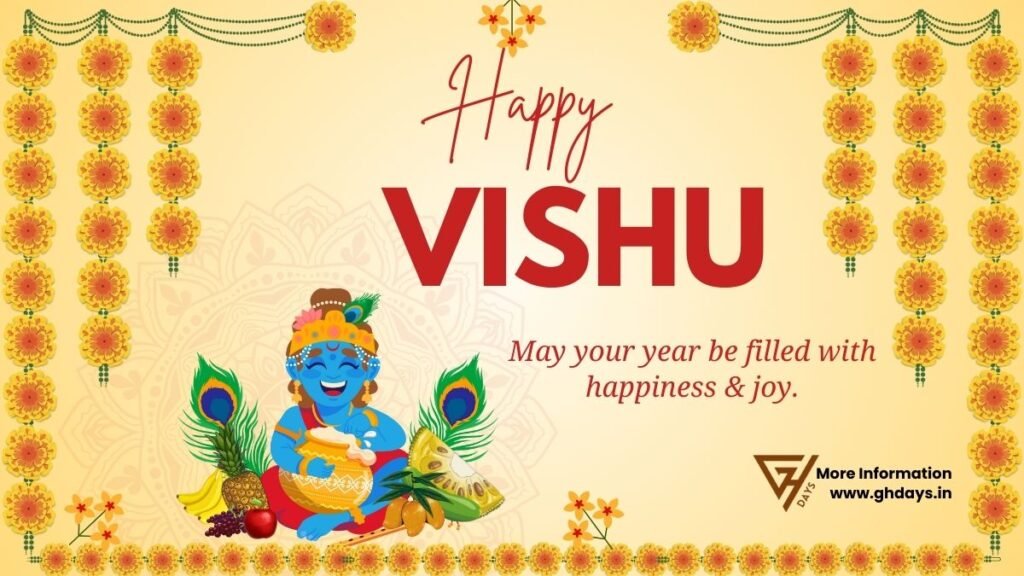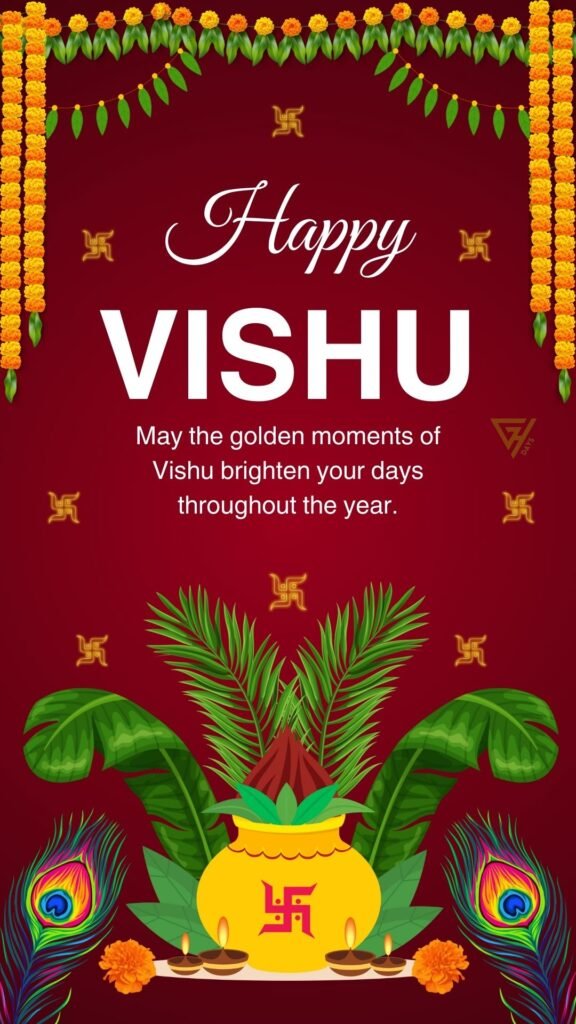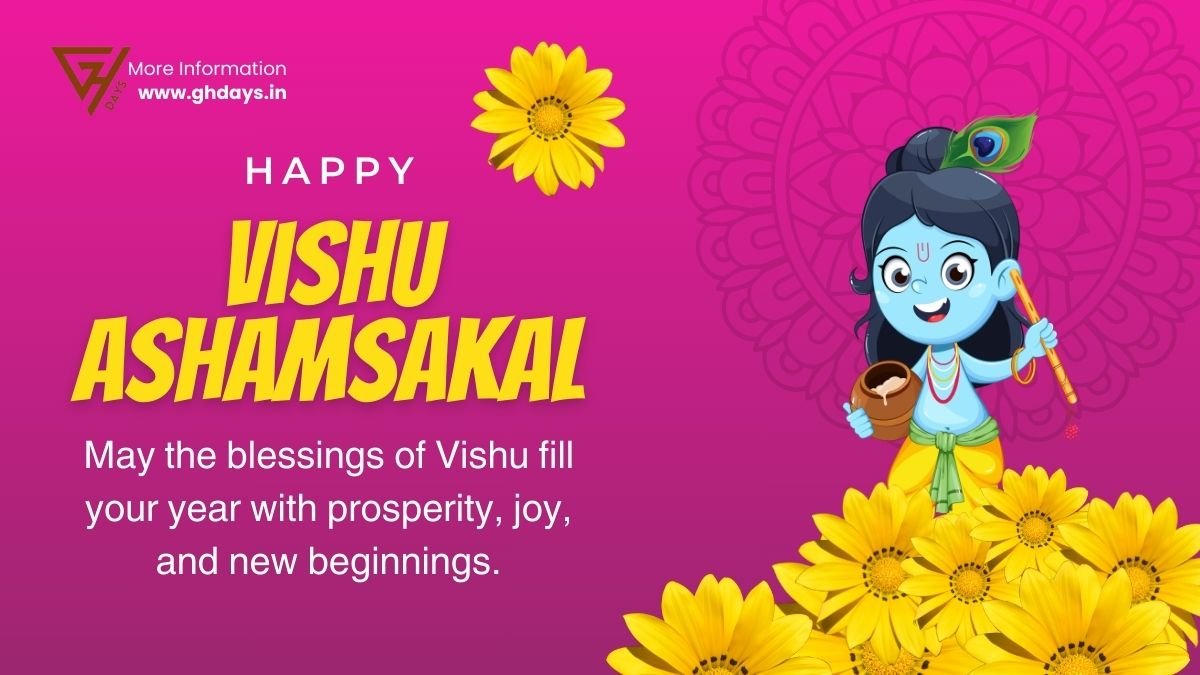Vishu Date 2025: Learn about the Timings, Rituals & Significance of Kerala’s Harvest Festival – GHdays
Vishu, the Malayalam New Year, is a momentous celebration observed in Kerala, a state in southern India. This festive event marks the commencement of a new year in the Malayalam calendar, usually occurring around mid-April. Vishu holds immense cultural and religious importance for the Keralite community, representing abundance, rejuvenation, and the optimism for a prosperous year ahead. The festival is distinguished by a variety of age-old customs and practices deeply embedded in the region’s diverse cultural legacy. This piece will take a closer look at the lively festivities of Vishu, delving into its customs, symbolism, and the sense of camaraderie it fosters among the populace.
Vishu Date 2025: Monday, April 14
Table of Contents
Vishu Date 2025 Overview
| Festival Name | Vishu |
| Observed by | Malayali People |
| Type | Cultural, Seasonal |
| Significance | Malayali Harvest Festival |
| Observances | Kani, Kaineetam, Kanji, Kani konna, Optionally Padakkam (firecrackers) |
| Begins | 4:00 am Brahma Muhurta |
| Date | First day of the month of medam (Aries) in the Malayalam calendar |
| Holiday Type | Restricted Holiday |
Vishu Date and Time 2025
Vishu Kani 2025 Time: On Monday, April 14, 2025, the traditional Malayali festival of Vishu will be celebrated with the setting up of the Vishu Kani, a ceremonial arrangement of auspicious items that symbolize prosperity and good fortune. The Sankranti Moment, marking the transition of the sun into the first zodiac sign of Aries, will occur at precisely 03.30 AM on April 14, signaling the beginning of a new astrological year and a time for new beginnings and fresh opportunities.
When is Vishu 2025 in Kerala?
Vishu, a customary festival observed in the Indian state of Kerala, typically falls on either the 14th or 15th of April annually. This significant occasion signifies the commencement of the Malayalam New Year and is eagerly anticipated by the residents of Kerala. It is a period of happiness, fresh starts, and festivities, as families unite to partake in time-honored traditions and practices. The timing of Vishu is established according to the solar calendar, and it is thought to bestow prosperity and blessings upon all participants.
| Vishu Date 2023 | Saturday, 15 April |
| Vishu Date 2024 | Sunday, 14 April |
| Vishu Date 2025 | Monday, 14 April |
| Vishu Date 2026 | Wednesday, 15 April |
| Vishu Date 2027 | Thursday, 15 April |
| Vishu Date 2028 | Friday, 14 April |
Rituals and Traditions of Vishu
The observance of Vishu entails a sequence of rituals carried out with deep reverence and zeal. A key aspect of this celebration is the creation of the “Vishukkani,” which signifies “the first sight on Vishu morning.” The Vishukkani comprises a display of propitious items like rice, fruits, vegetables, flowers, gold coins, and a mirror. Tradition holds that beholding the Vishukkani upon waking brings about good fortune and success throughout the year.
Another notable custom is the “Vishukkaineetam,” which involves presenting money or gifts to younger family members. This gesture of kindness represents the act of sharing wealth and blessings with loved ones. Additionally, it is customary for individuals to visit temples on Vishu morning to seek blessings and offer prayers for a prosperous year ahead.
The Feast of Vishu Festival
In Kerala, every festivity culminates in a lavish feast, and Vishu is no different. The customary Vishu feast, referred to as “Sadya,” is a significant event that highlights the diverse culinary legacy of the area. This elaborate spread comprises an assortment of vegetarian delicacies presented on a banana leaf, encompassing rice, sambar, avial (a medley of vegetables), thoran (sautéed vegetables), and payasam (a delectable dessert). The feast serves as a representation of prosperity and solidarity, fostering familial connections through the act of communal dining.
Symbolism and Customs of Vishu
Vishu is a cultural festival rich in symbolism, where each component carries significant meaning. The radiant golden blooms of the Konna tree, symbolizing auspiciousness, play a central role in the Vishu festivities. Individuals adorn their residences with these lively flowers to enhance the celebratory ambiance. Additionally, the tradition of lighting lamps, referred to as “Vishu Vilakku,” holds considerable importance during this occasion. It is believed that the illumination from these lamps serves as a protective barrier against malevolent forces and ushers in abundance and joy.
Significance of Vishu
Vishu is of significant cultural and religious significance to the residents of Kerala. Tradition holds that an individual’s luck for the upcoming year is determined by the first sight they encounter on Vishu morning. Hence, a customary observance known as “Vishukkani” is conducted, involving the arrangement of a ceremonial tray before a deity. This tray includes symbolic elements such as a golden cucumber, rice, fruits, flowers, and a mirror. This propitious spectacle is the initial view upon awakening on Vishu morning.
Celebrations of Vishu Festival
On Vishu, people dress up in new clothes and visit temples to seek blessings for a prosperous year ahead. Special feasts are prepared, consisting of traditional delicacies like “Vishu Kanji” (a dish made with rice, coconut milk, and spices) and “Vishu Sadya” (a grand vegetarian feast served on a banana leaf). Fireworks, cultural programs, and traditional games like “Vishu Kani Kazhcha” (collecting gifts from elders) are also part of the celebrations.
Vishu is a time for family gatherings and bonding. It is a festival that symbolizes hope, new beginnings, and the spirit of unity among the people of Kerala. Overall, Vishu is a cherished festival that brings joy and happiness to the lives of people in Kerala. The 2025 Vishu celebration on 14th April, Monday, will be a day filled with traditional rituals, delicious food, and the warmth of family and friends.
Happy Vishu 2025 Images

Happy Vishu 2025 Facebook and Stories

Happy Vishu 2025 Instagram Reels and Status

